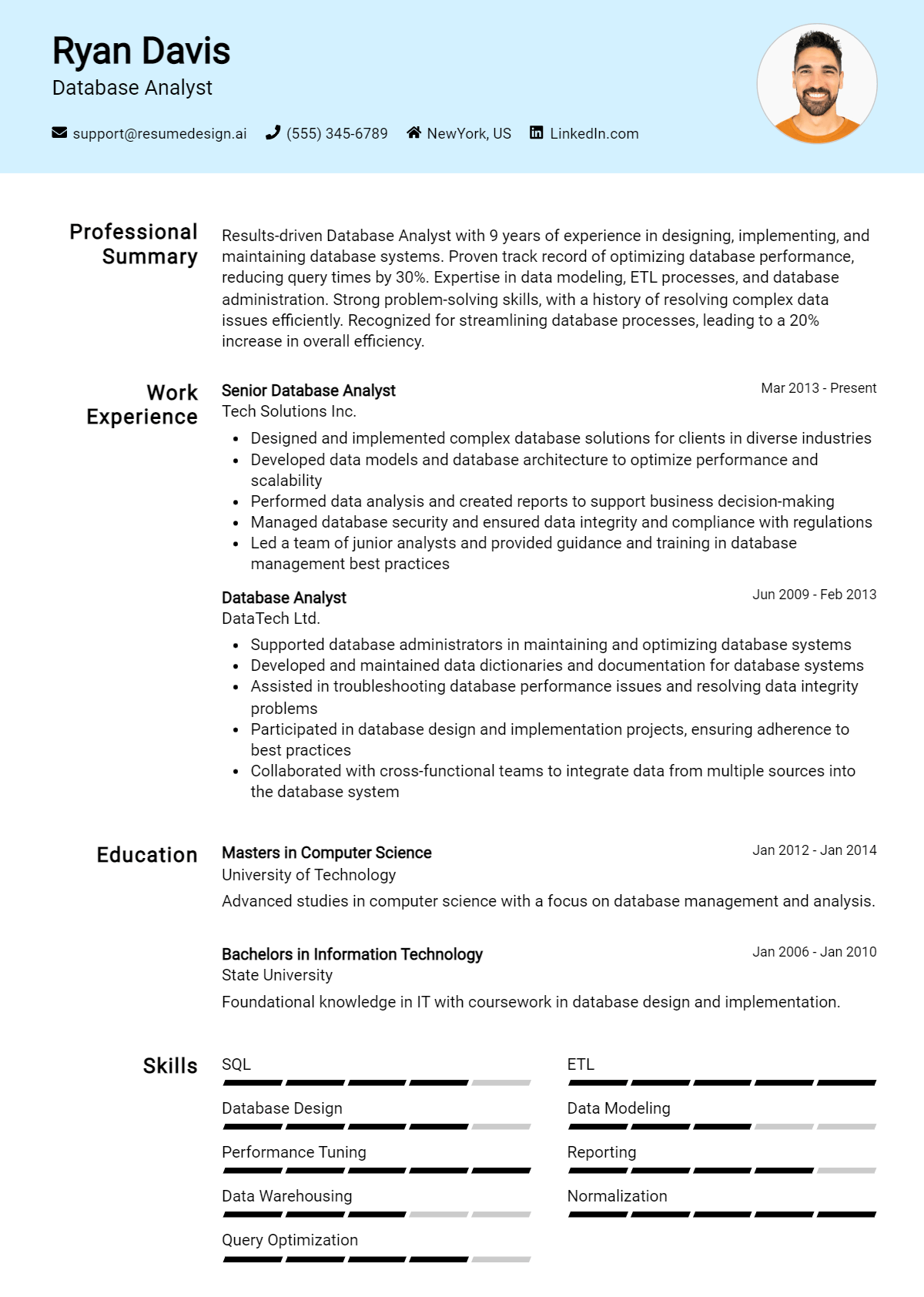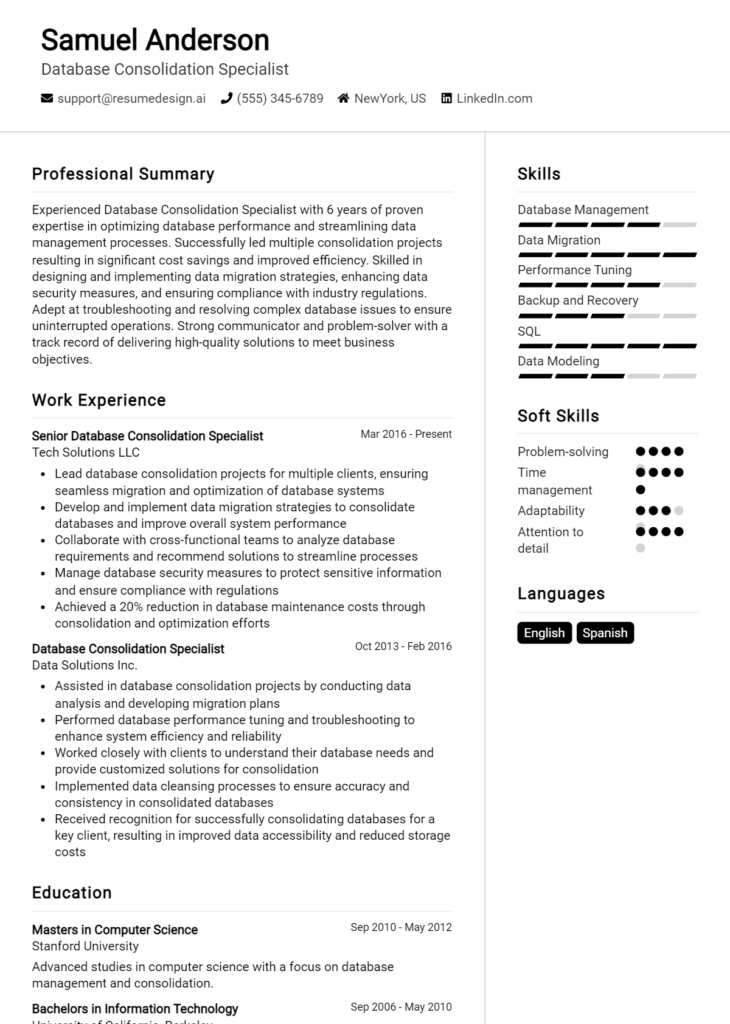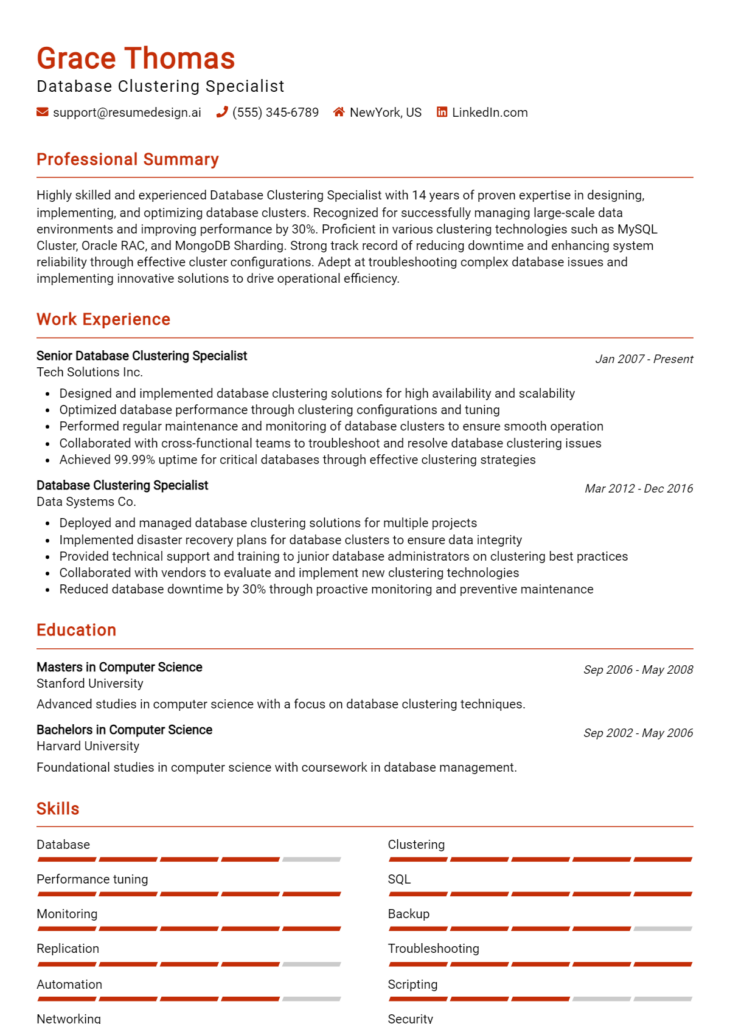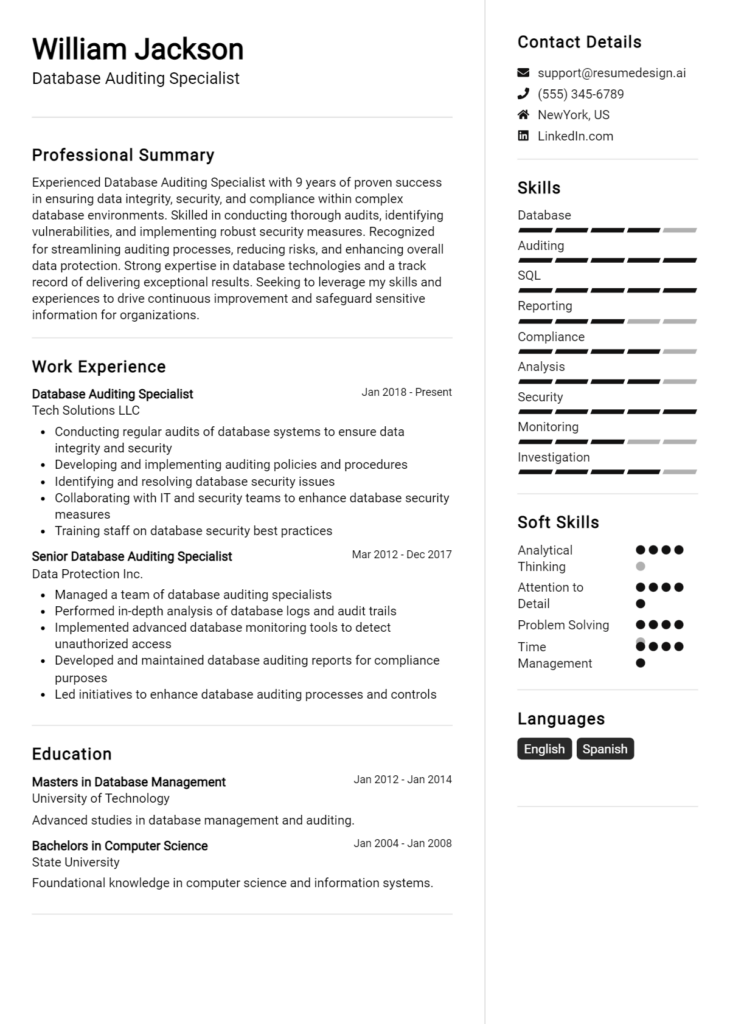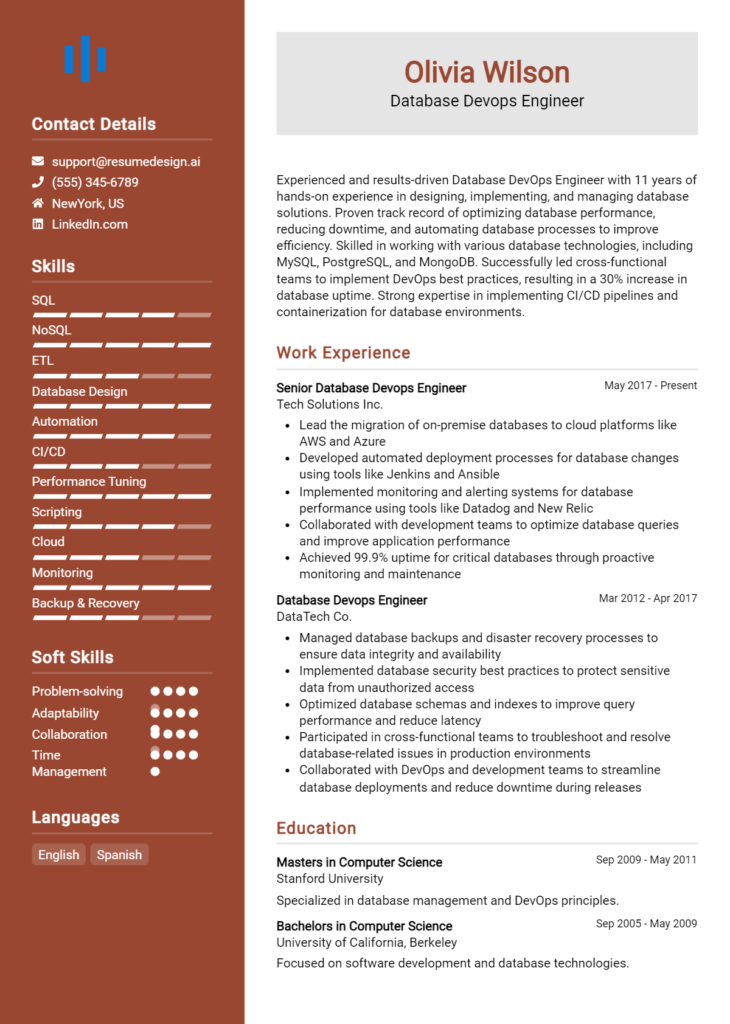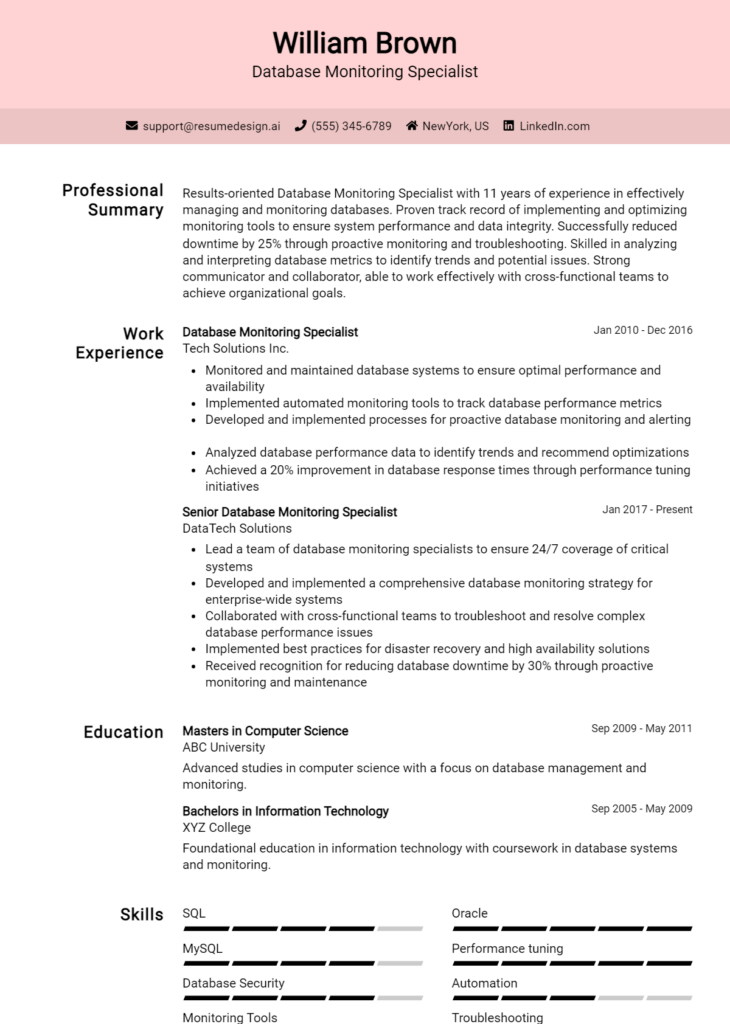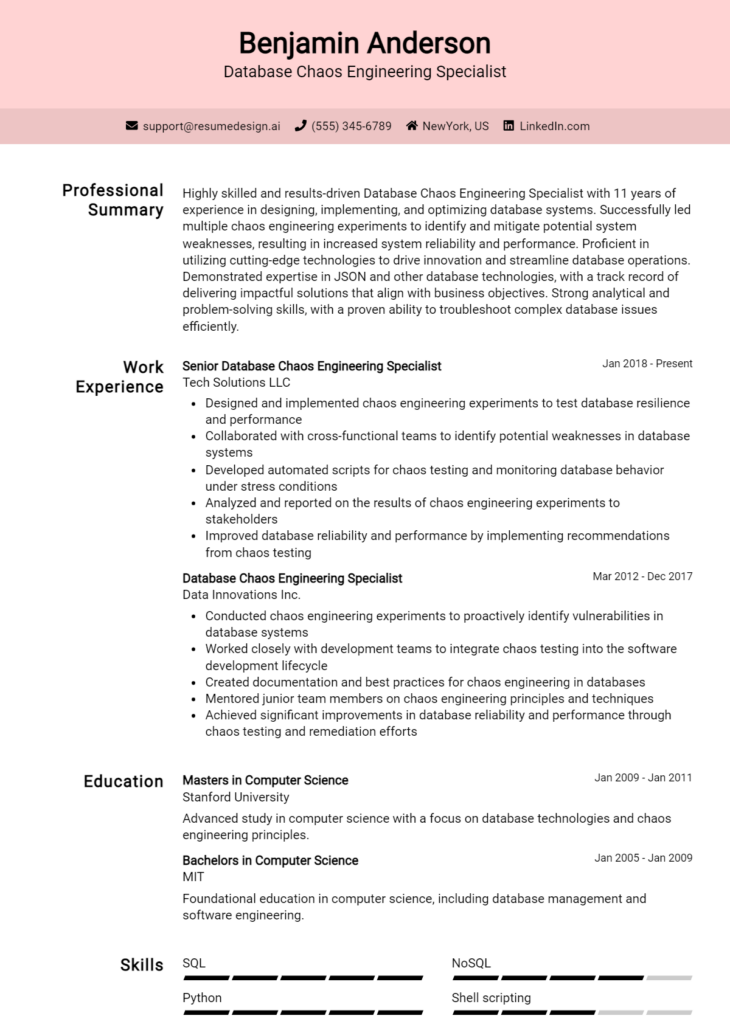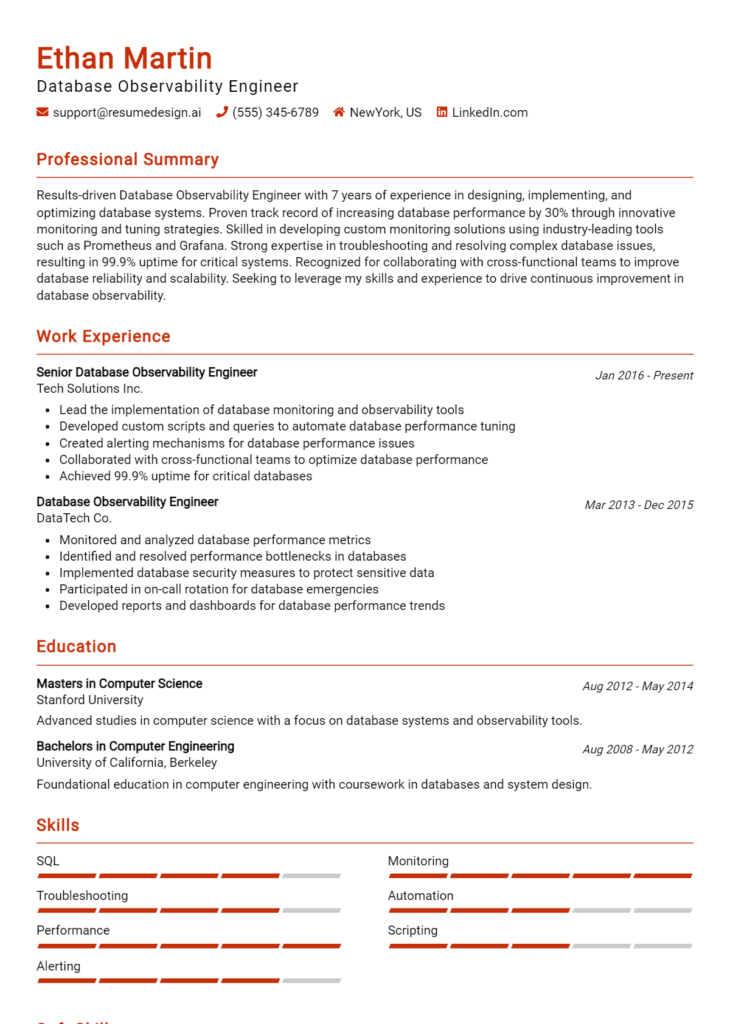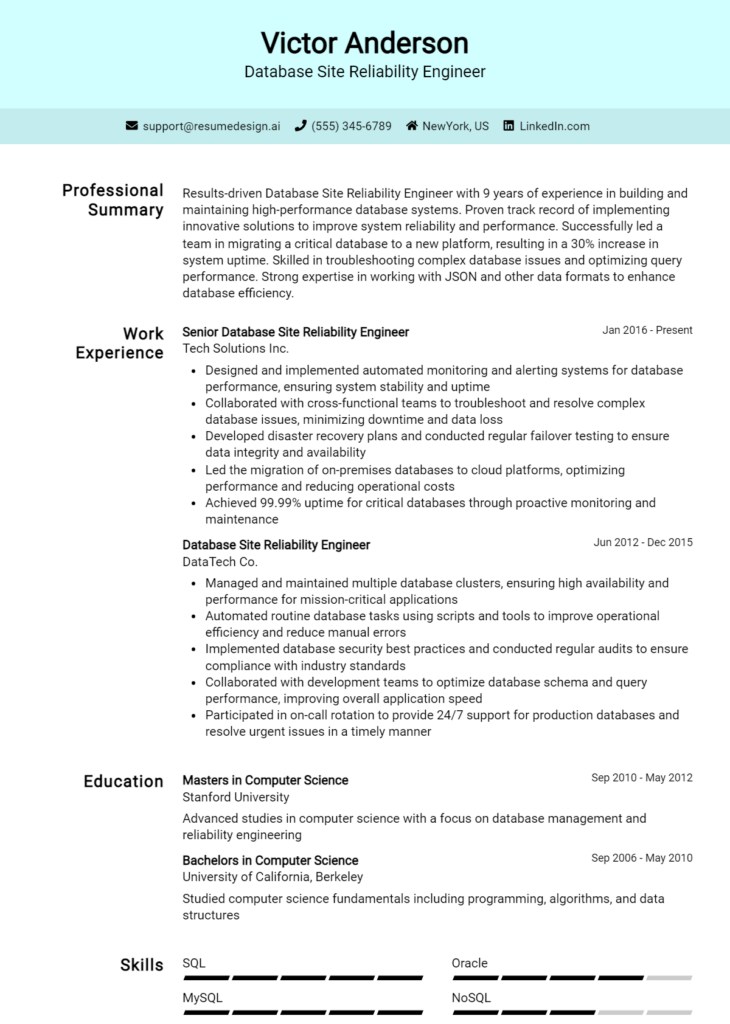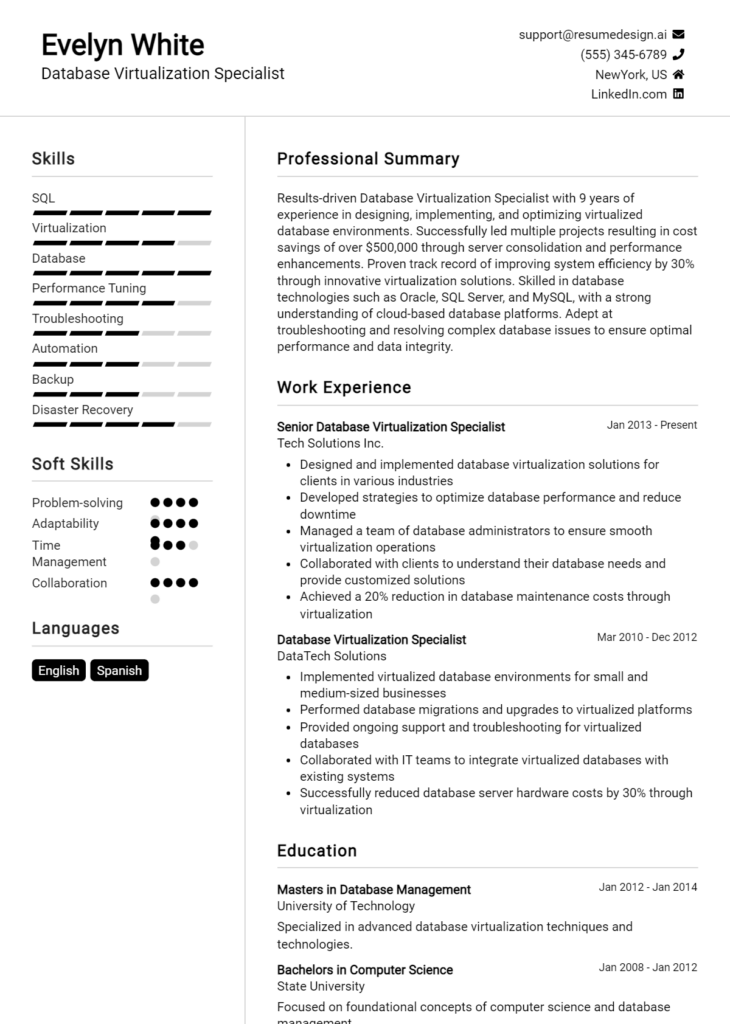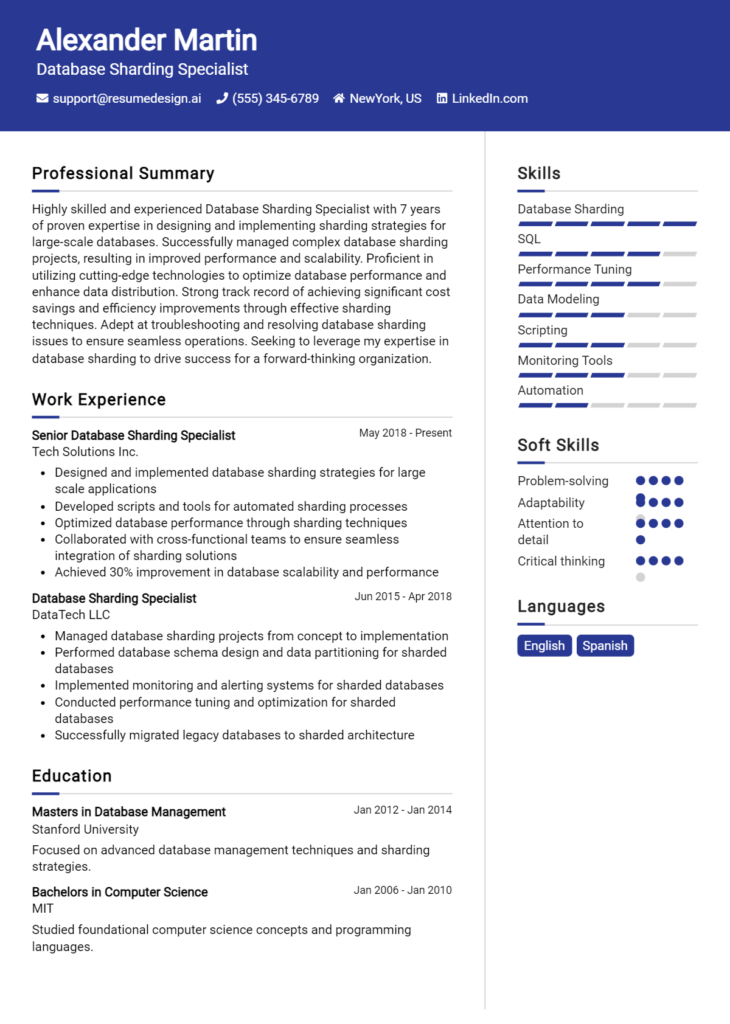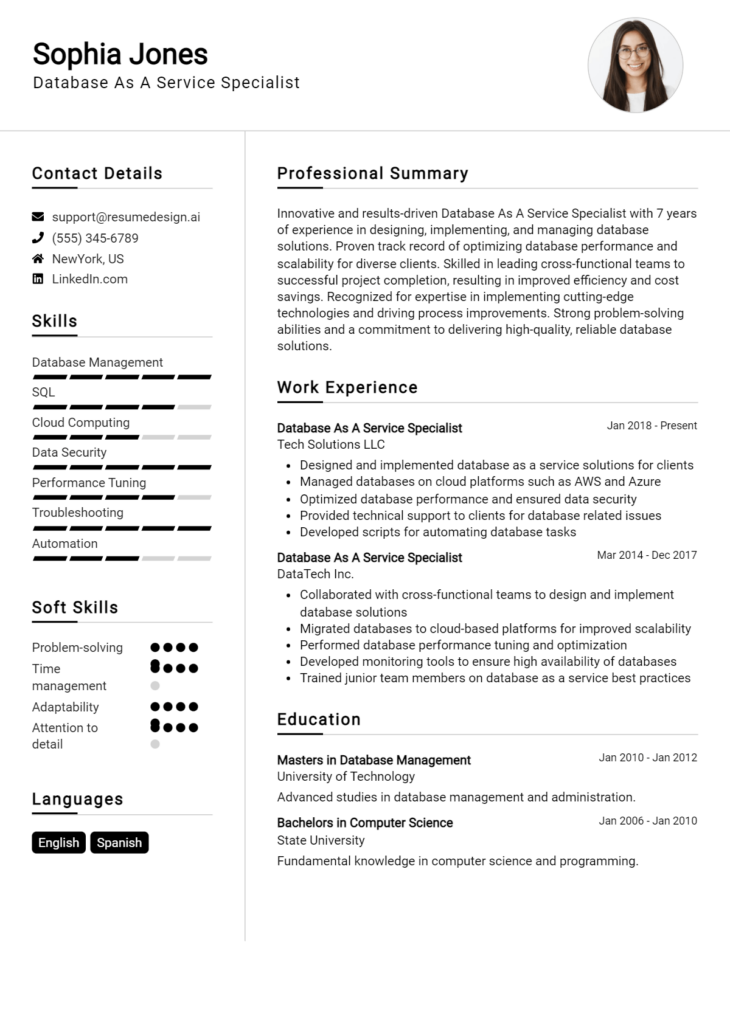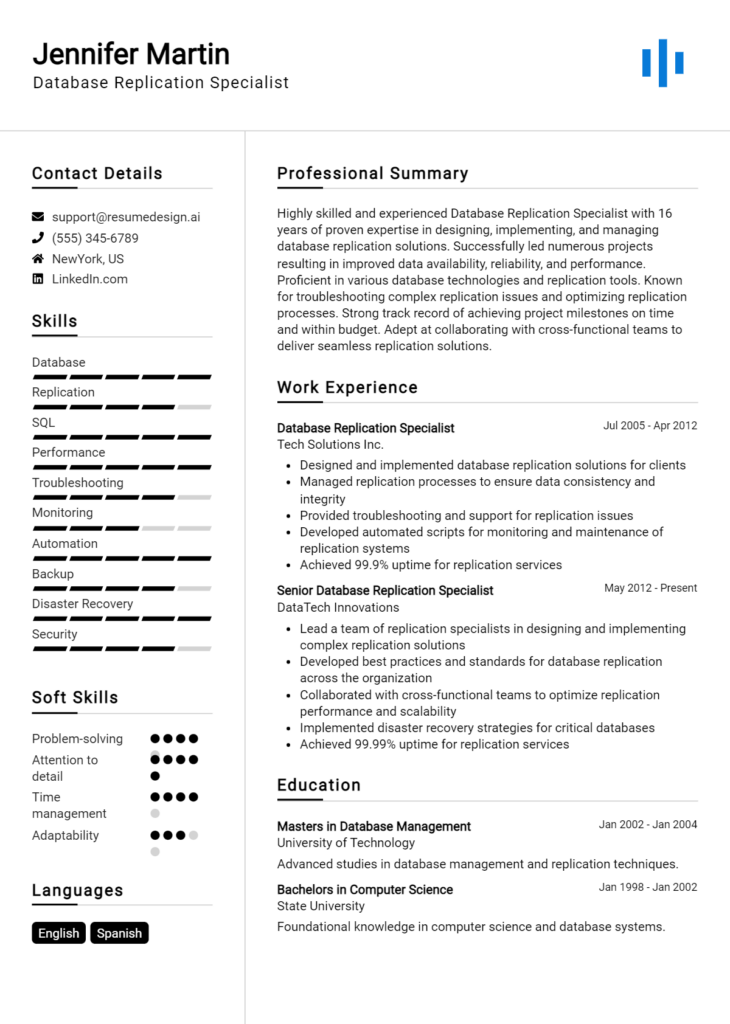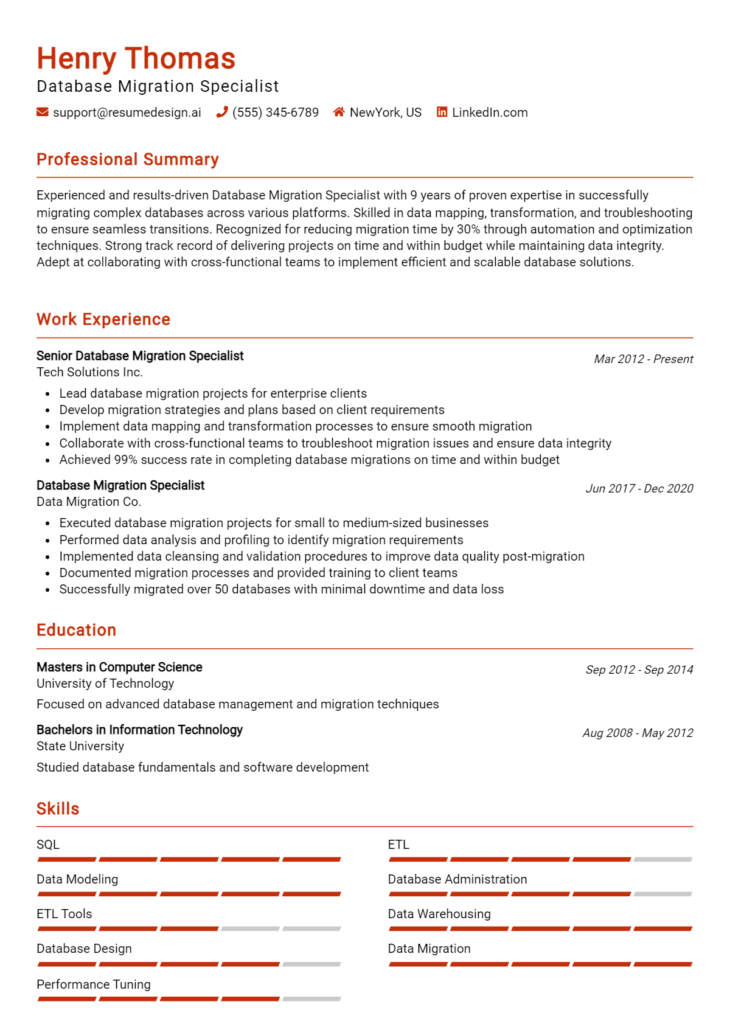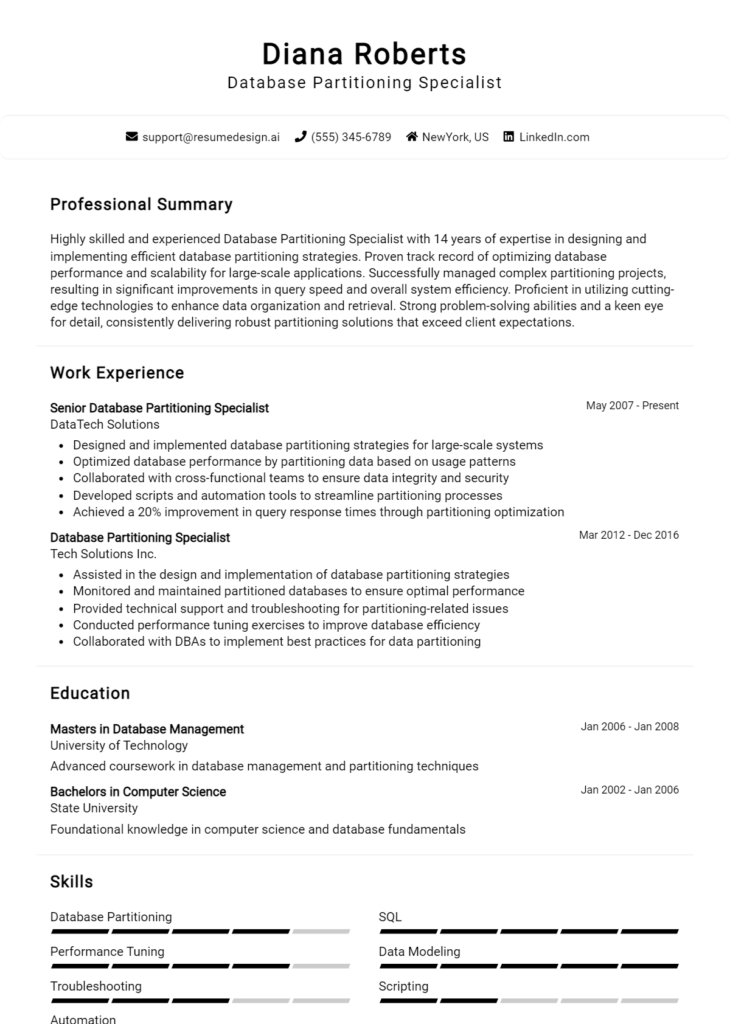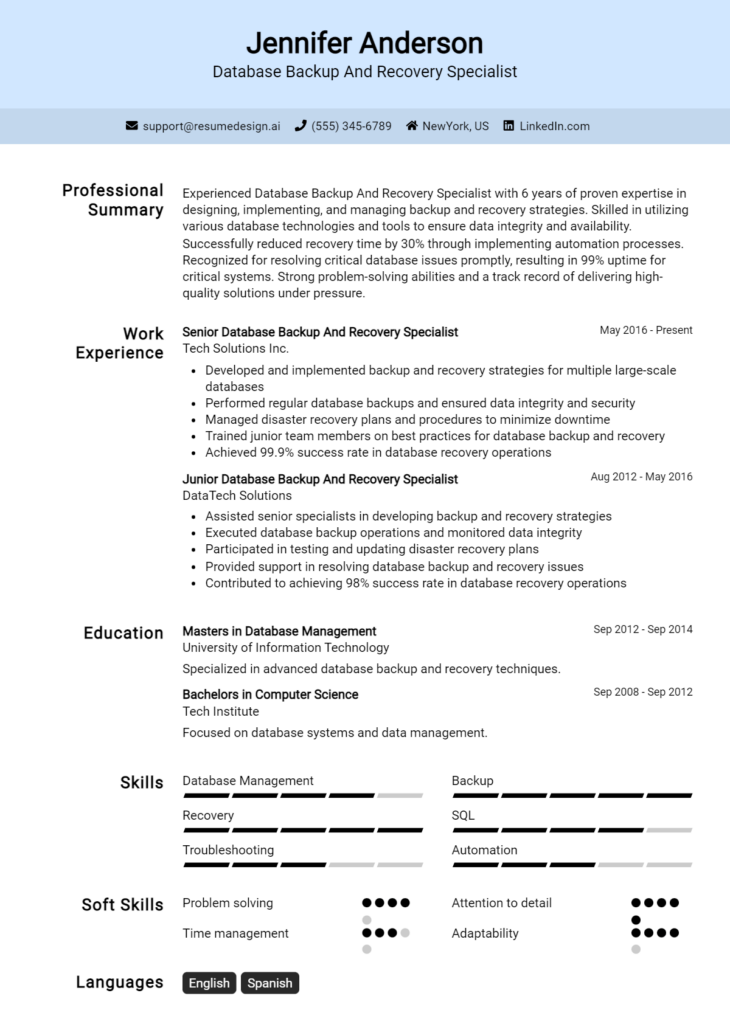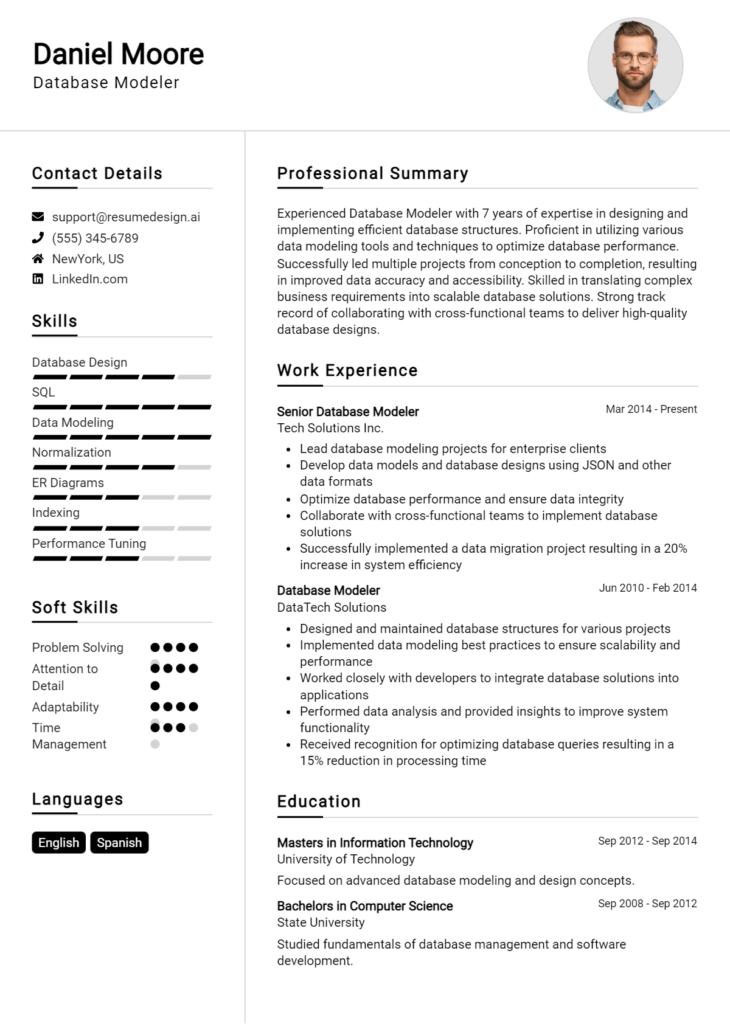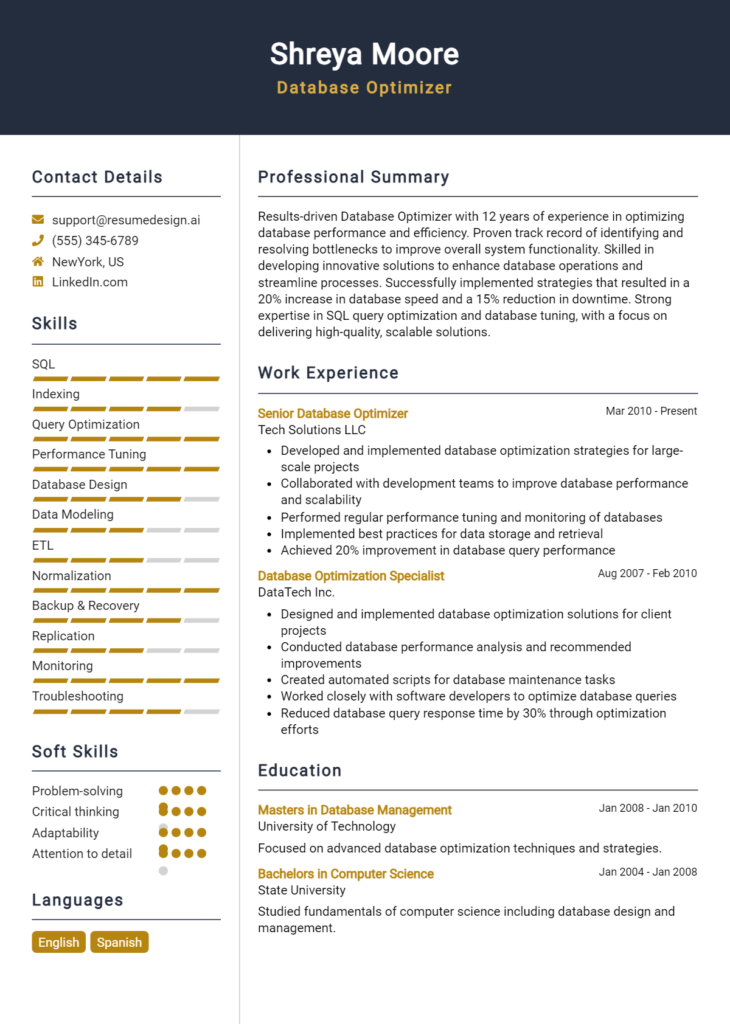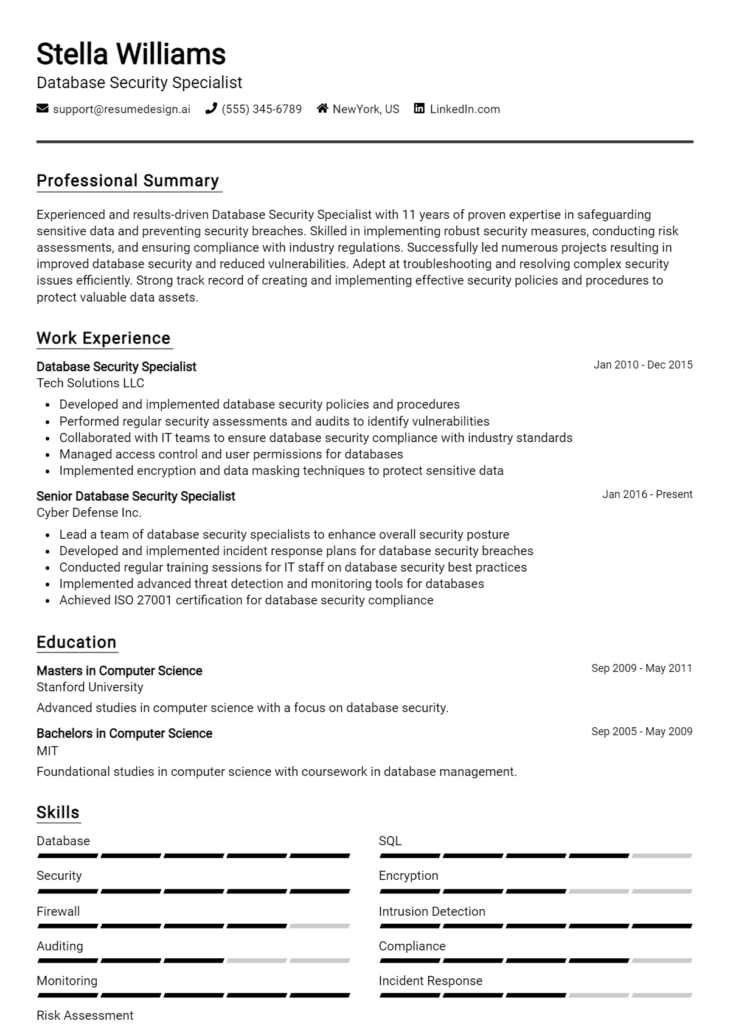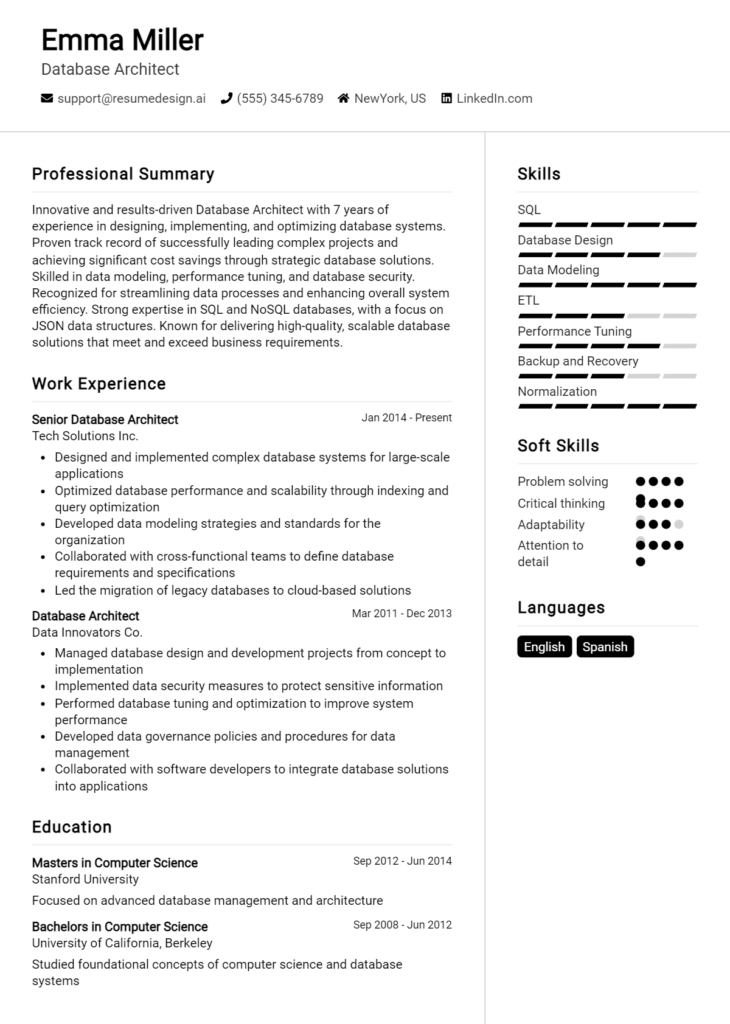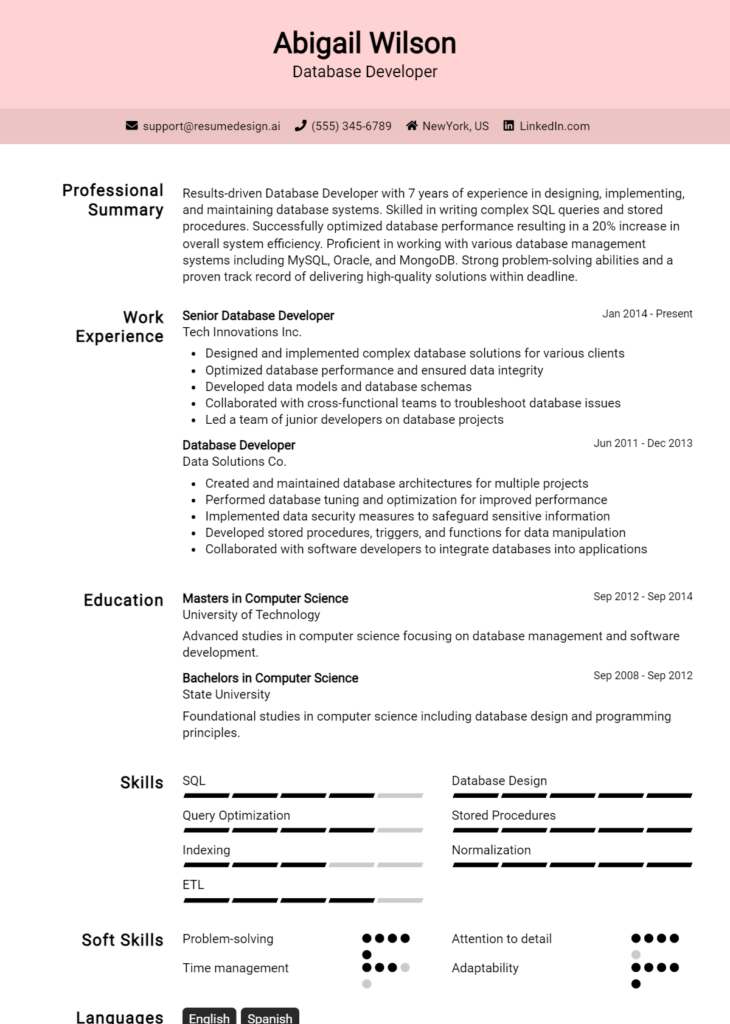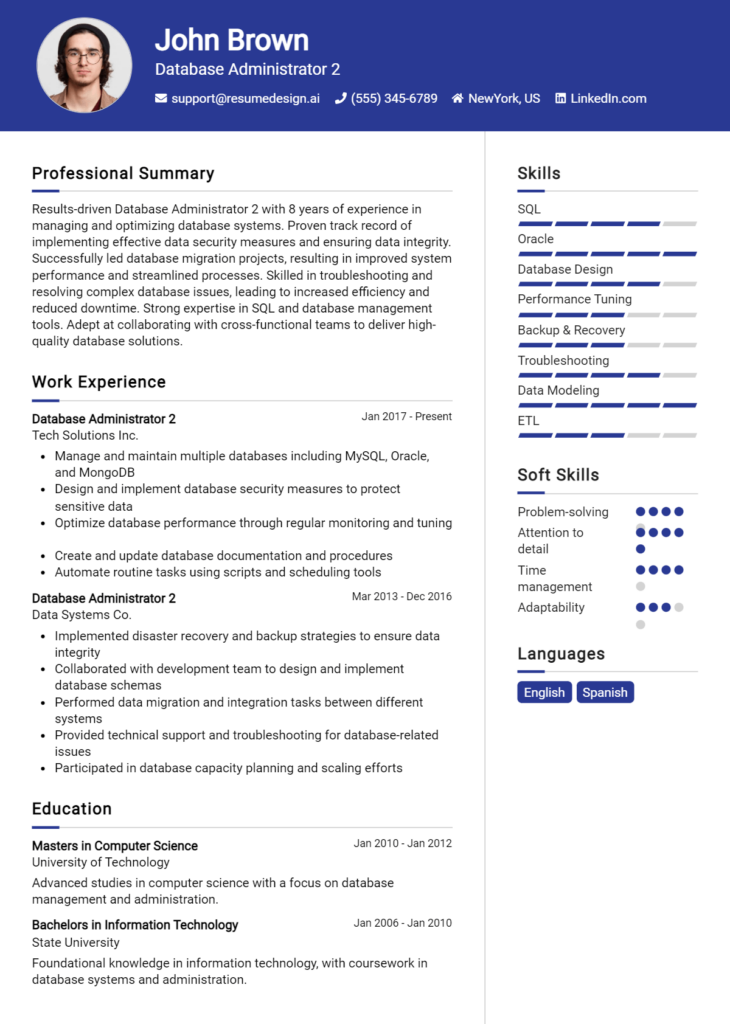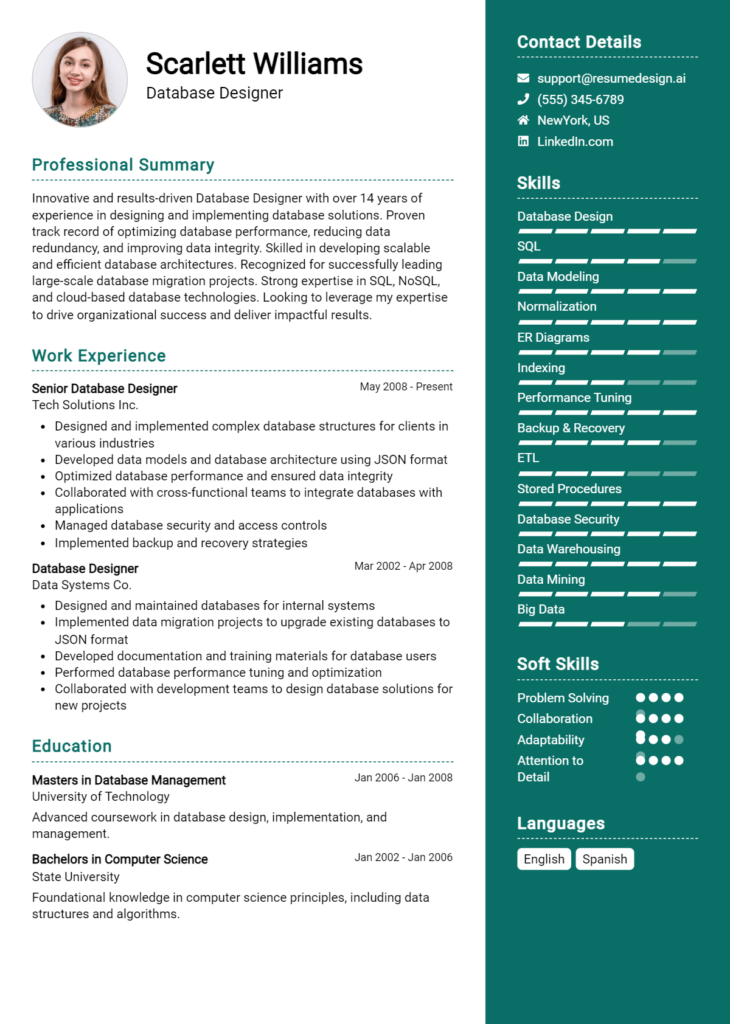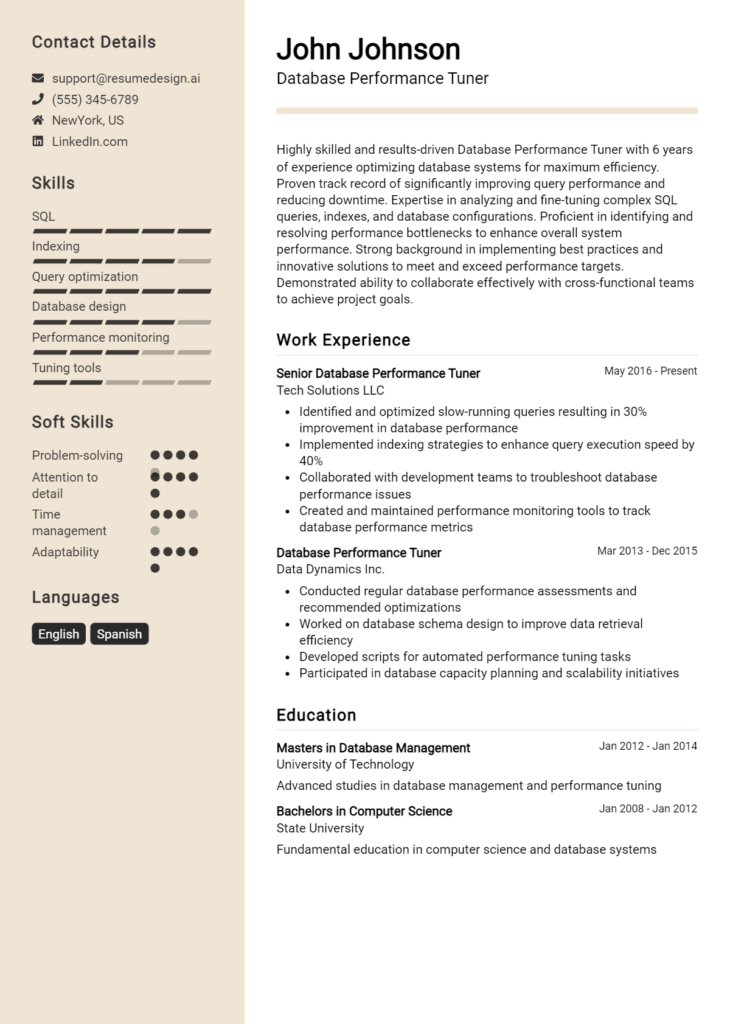Database Analyst Core Responsibilities
A Database Analyst plays a crucial role in managing and analyzing data to support various business functions. Key responsibilities include designing and maintaining databases, ensuring data integrity, and generating reports to inform decision-making across departments. Essential skills encompass technical proficiency in database management systems, operational efficiency, and strong problem-solving capabilities. These abilities not only contribute to organizational goals but also enhance collaboration among teams. A well-structured resume can effectively showcase these qualifications, highlighting the analyst’s impact on business success.
Common Responsibilities Listed on Database Analyst Resume
- Designing, implementing, and maintaining database systems.
- Ensuring data accuracy and integrity through regular audits.
- Developing and generating reports for stakeholders.
- Collaborating with IT and business teams to identify data needs.
- Troubleshooting database issues and providing solutions.
- Optimizing database performance and efficiency.
- Implementing security measures to protect sensitive data.
- Conducting data modeling and analysis.
- Training staff on database usage and best practices.
- Documenting database procedures and user guidelines.
- Staying updated on database technologies and trends.
High-Level Resume Tips for Database Analyst Professionals
In today's competitive job market, a well-crafted resume is essential for Database Analyst professionals aiming to stand out among a sea of candidates. The resume serves as the first impression a candidate makes on a potential employer, making it crucial to reflect both technical skills and professional achievements effectively. A strong resume not only outlines relevant qualifications but also tells a compelling story of how the candidate can add value to a prospective employer. This guide will provide practical and actionable resume tips specifically tailored for Database Analyst professionals to help you create a document that truly represents your capabilities and accomplishments.
Top Resume Tips for Database Analyst Professionals
- Tailor your resume to match the job description by using relevant keywords and phrases from the posting.
- Highlight your technical expertise in database management systems, such as SQL, Oracle, or MongoDB.
- Showcase your experience with data analysis tools and software, emphasizing proficiency in analytics platforms.
- Quantify your achievements by including metrics, such as improvements in database performance or data retrieval times.
- Include industry-specific skills, such as data modeling, data warehousing, and ETL processes.
- Demonstrate your problem-solving skills by providing examples of challenges you’ve overcome in past roles.
- Keep your resume clear and concise, ideally no longer than one to two pages, focusing on the most relevant information.
- Incorporate a professional summary at the top that encapsulates your experience, skills, and career goals.
- Use action verbs to describe your responsibilities and achievements, making your contributions more impactful.
By implementing these tips, Database Analyst professionals can significantly increase their chances of landing a job in this dynamic field. A resume that effectively showcases your skills and achievements not only captures the attention of hiring managers but also positions you as a strong candidate for the roles you aspire to. Crafting a compelling resume is the first step in showcasing your potential and securing your next opportunity.
Why Resume Headlines & Titles are Important for Database Analyst
In the competitive landscape of job applications, a well-crafted resume headline or title is crucial for a Database Analyst. This brief but impactful phrase serves as the first impression for hiring managers, summarizing a candidate's key qualifications in just a few words. A strong headline can immediately grab attention, effectively highlighting the applicant's relevant skills, experience, and accomplishments. It is essential that the headline be concise, relevant, and directly aligned with the specific job being applied for, ensuring it resonates with the expectations of potential employers.
Best Practices for Crafting Resume Headlines for Database Analyst
- Keep it concise: Limit your headline to a few impactful words or a short phrase.
- Be role-specific: Tailor the headline to reflect the job title you are applying for.
- Highlight key skills: Include specific skills or technologies relevant to database analysis.
- Focus on achievements: Mention any significant accomplishments that set you apart.
- Use industry keywords: Incorporate terms and phrases commonly found in job descriptions.
- Maintain professionalism: Ensure the tone is appropriate for the industry.
- Avoid clichés: Steer clear of overused phrases that lack originality.
- Make it attention-grabbing: Use strong language to create interest and curiosity.
Example Resume Headlines for Database Analyst
Strong Resume Headlines
“Data-Driven Database Analyst with 5+ Years of Experience in SQL and Data Modeling”
“Proven Database Analyst Specializing in Data Migration and Performance Optimization”
“Detail-Oriented Database Analyst with Expertise in Big Data Analytics and Reporting”
Weak Resume Headlines
“Database Analyst Seeking Opportunities”
“Professional with Experience in Databases”
The strong resume headlines are effective because they clearly articulate the candidate's strengths and areas of expertise in a precise and engaging manner. They utilize specific details that align with the expectations of hiring managers, making them more memorable. In contrast, the weak headlines fail to impress due to their vagueness and lack of specificity, making it difficult for employers to gauge the applicant's qualifications or interest in the position. By avoiding generic language and instead focusing on relevant skills and accomplishments, candidates can significantly enhance their chances of making a positive impression.
Writing an Exceptional Database Analyst Resume Summary
A resume summary is a crucial component of a Database Analyst's resume, serving as the first impression for hiring managers. A well-crafted summary succinctly highlights the candidate's key skills, relevant experience, and notable accomplishments in the field of database management and analysis. In an industry where attention to detail and analytical prowess are paramount, a strong summary can quickly capture the interest of potential employers, effectively setting the tone for the rest of the resume. It should be concise, impactful, and tailored specifically to the job the candidate is pursuing, ensuring that it aligns with the employer's needs and expectations.
Best Practices for Writing a Database Analyst Resume Summary
- Quantify Achievements: Use specific numbers and metrics to demonstrate the impact of your work.
- Focus on Relevant Skills: Highlight the technical skills and tools that are most relevant to the job description.
- Tailor for the Job Description: Customize your summary to reflect the specific requirements and responsibilities of the position.
- Showcase Problem-Solving Abilities: Emphasize your ability to analyze complex data sets and derive actionable insights.
- Include Industry Terminology: Use relevant jargon and terms that resonate with hiring managers in the database field.
- Keep it Concise: Aim for 3-5 sentences that pack a punch without becoming overly verbose.
- Highlight Soft Skills: Incorporate interpersonal skills such as teamwork, communication, and adaptability where applicable.
- Use Active Language: Start sentences with strong action verbs to create a dynamic impression.
Example Database Analyst Resume Summaries
Strong Resume Summaries
Detail-oriented Database Analyst with over 5 years of experience in optimizing database performance. Successfully reduced query response time by 30% through strategic indexing and query optimization techniques.
Proficient in SQL and data visualization tools, with a track record of delivering actionable insights that enhanced decision-making processes by 25% in a fast-paced corporate environment.
Results-driven analyst with expertise in data mining and predictive modeling. Led a team project that improved data accuracy by 40%, resulting in significant cost savings for the organization.
Analytical Database Specialist skilled in ETL processes and relational database management, recognized for designing a data warehouse solution that increased reporting efficiency by 50%.
Weak Resume Summaries
Experienced Database Analyst looking for opportunities to work with data.
Skilled in database management and analysis with knowledge of various tools and technologies.
The examples of strong resume summaries are effective because they incorporate specific accomplishments, quantify results, and highlight relevant skills that align with the role of a Database Analyst. In contrast, the weak resume summaries lack detail, are overly generic, and fail to provide any measurable outcomes, making it difficult for hiring managers to gauge the candidate's true abilities and potential contributions to the organization.
Work Experience Section for Database Analyst Resume
The work experience section is a critical component of a Database Analyst resume, serving as a showcase for a candidate's technical skills, leadership capabilities, and their ability to deliver high-quality data solutions. This section not only highlights the specific tools and technologies the candidate has mastered but also demonstrates their proficiency in managing teams and collaborating with stakeholders to achieve project goals. By quantifying achievements and aligning experiences with industry standards, candidates can effectively illustrate their value to potential employers and set themselves apart in a competitive job market.
Best Practices for Database Analyst Work Experience
- Focus on specific technical skills relevant to database management, such as SQL, data modeling, and ETL processes.
- Quantify achievements with metrics, such as percentage improvements in database performance or cost savings generated through optimization.
- Highlight collaborative projects that demonstrate your ability to work with cross-functional teams, including developers and business analysts.
- Use action verbs to begin each bullet point, emphasizing contributions and outcomes.
- Tailor your experiences to match the job description, ensuring that your past roles align with the skills required by the employer.
- Include any leadership roles or mentorship experiences that showcase your ability to guide and develop team members.
- Document any relevant certifications or training that enhance your qualifications as a database analyst.
- Prioritize recent experiences to highlight your current skills and knowledge in the field.
Example Work Experiences for Database Analyst
Strong Experiences
- Led a team of 5 analysts in a database optimization project that improved query performance by 40%, resulting in a significant reduction in processing time.
- Implemented a new data governance framework that reduced data discrepancies by 30%, enhancing the overall accuracy and reliability of the reporting process.
- Collaborated with cross-functional teams to design and deploy a new data warehousing solution, which increased data retrieval efficiency by 25% and supported real-time analytics.
- Executed a data migration strategy that successfully transitioned 1 million records to a new platform with zero data loss and a 15% cost reduction.
Weak Experiences
- Worked on various database projects and tasks.
- Assisted in team initiatives related to data management.
- Participated in meetings discussing database optimization.
- Helped with general database maintenance and support.
The examples provided highlight a stark contrast between strong and weak experiences. Strong experiences are characterized by specific, quantifiable achievements and clear indications of leadership and collaboration. They demonstrate the candidate's direct impact on projects and their ability to drive results. In contrast, weak experiences are vague and lack detail, failing to convey the candidate's actual contributions or the significance of their roles. This distinction is vital for making a compelling case to potential employers.
Education and Certifications Section for Database Analyst Resume
The education and certifications section of a Database Analyst resume is crucial for establishing the candidate's foundational knowledge and expertise in the field. This section not only showcases the academic background that equips the candidate with essential skills but also highlights industry-relevant certifications and ongoing educational pursuits. By providing details about relevant coursework, specialized training, and recognized credentials, candidates can significantly enhance their credibility and demonstrate their commitment to professional growth. This alignment can make a compelling case for their suitability for the Database Analyst role, distinguishing them from other applicants.
Best Practices for Database Analyst Education and Certifications
- List degrees that are relevant to database management, data analysis, or computer science.
- Include industry-recognized certifications such as Microsoft Certified: Azure Database Administrator Associate or Oracle Certified Professional.
- Highlight any specialized training, workshops, or boot camps that focus on database technologies.
- Provide details about relevant coursework that pertains to data modeling, SQL, or database design.
- Keep the information organized and easy to read, using clear headings and bullet points.
- Update the section regularly to include new certifications or completed courses.
- Emphasize any honors or distinctions received during academic pursuits.
- Tailor the section to match the specific requirements of the job description.
Example Education and Certifications for Database Analyst
Strong Examples
- Bachelor of Science in Computer Science, University of XYZ, Graduated May 2022
- Microsoft Certified: Azure Database Administrator Associate, Earned March 2023
- Advanced SQL for Data Science, Coursera, Completed July 2023
- Data Management Fundamentals, ABC Institute, Completed December 2021
Weak Examples
- Bachelor of Arts in English Literature, University of ABC, Graduated May 2018
- Certification in Basic Computer Skills, Online Course, Completed January 2020
- High School Diploma, XYZ High School, Graduated June 2016
- Certification in Microsoft Word, Completed August 2019
The examples provided illustrate a clear distinction between strong and weak educational qualifications. Strong examples demonstrate relevance to the Database Analyst role, showcasing degrees and certifications that align with the necessary skills and knowledge in data management. In contrast, weak examples highlight qualifications that are either unrelated to the field or lack the depth and specificity required to enhance the candidate's appeal for a Database Analyst position. By focusing on relevant education and certifications, candidates can effectively position themselves as qualified contenders in a competitive job market.
Top Skills & Keywords for Database Analyst Resume
As a Database Analyst, possessing the right skills is crucial for success in this role. A well-crafted resume that highlights relevant skills not only showcases your expertise but also sets you apart from other candidates in a competitive job market. Employers seek individuals who can efficiently manage databases, analyze data trends, and ensure data integrity. By effectively communicating your skills, you demonstrate your ability to contribute to the organization’s data management strategies and support decision-making processes. This is why focusing on both hard and soft skills in your resume is essential to present a well-rounded profile to potential employers.
Top Hard & Soft Skills for Database Analyst
Soft Skills
- Analytical Thinking
- Problem Solving
- Attention to Detail
- Communication Skills
- Team Collaboration
- Time Management
- Adaptability
- Critical Thinking
- Project Management
- Customer Service Orientation
Hard Skills
- SQL Proficiency
- Database Design
- Data Model Development
- Data Warehousing
- ETL (Extract, Transform, Load) Processes
- Performance Tuning
- Database Security Management
- Reporting and Visualization Tools (e.g., Tableau, Power BI)
- Familiarity with NoSQL Databases
- Knowledge of Programming Languages (e.g., Python, R)
By integrating these skills into your resume and pairing them with relevant work experience, you can create a compelling narrative that highlights your qualifications as a Database Analyst.
Stand Out with a Winning Database Analyst Cover Letter
I am writing to express my interest in the Database Analyst position at [Company Name], as advertised on [where you found the job listing]. With a strong foundation in database management, data analysis, and problem-solving skills, I am confident in my ability to contribute effectively to your team. My experience in utilizing SQL, data visualization tools, and database design aligns well with the requirements outlined in the job description, allowing me to provide valuable insights and support your data-driven decision-making processes.
In my previous role at [Previous Company Name], I successfully managed and optimized complex database systems, ensuring data integrity and performance efficiency. By employing my analytical skills, I was able to identify performance bottlenecks and recommend solutions that reduced data retrieval times by 30%. Furthermore, I collaborated closely with cross-functional teams to develop reports and dashboards that provided actionable insights to stakeholders, ultimately enhancing operational efficiency and strategic planning. This experience has honed my ability to translate business needs into technical requirements, making me a strong candidate for this position.
I am particularly drawn to the opportunity at [Company Name] because of your commitment to leveraging data analytics to drive innovation and improve customer experiences. I am eager to bring my expertise in data modeling, ETL processes, and database security to your organization. I believe that my proactive approach to problem-solving and my passion for continuous learning will make me a valuable asset to your team. I am excited about the possibility of contributing to projects that have a meaningful impact on your operations while further developing my skills in a dynamic environment.
Thank you for considering my application. I look forward to the opportunity to discuss how my background in database analysis can help [Company Name] achieve its goals. I am eager to bring my technical skills and analytical mindset to your esteemed company and contribute to your continued success.
Common Mistakes to Avoid in a Database Analyst Resume
When crafting a resume as a Database Analyst, it's crucial to present your skills and experiences in a way that makes you stand out to potential employers. However, many candidates make common mistakes that can undermine their chances of landing an interview. Understanding these pitfalls and avoiding them can significantly enhance the effectiveness of your resume. Below are some frequent mistakes to watch out for:
Lack of Keywords: Failing to include relevant keywords from the job description can result in your resume being overlooked by Applicant Tracking Systems (ATS). Tailor your resume to match the specific terms and phrases used in the job posting.
Vague Job Descriptions: Listing job duties without specifics can make your experience seem less impactful. Use quantifiable achievements and clear examples to demonstrate your contributions and skills.
Ignoring Technical Skills: As a Database Analyst, technical proficiency is paramount. Omitting crucial skills such as SQL, database management systems, or data modeling can make your resume less compelling.
Overly Complex Language: Using jargon or overly technical language may alienate hiring managers who are not familiar with specific terms. Strive for clarity and accessibility in your descriptions.
Inconsistent Formatting: A cluttered or inconsistent format can make your resume difficult to read. Ensure uniformity in font styles, sizes, and spacing to create a more professional appearance.
Neglecting Soft Skills: While technical skills are essential, soft skills like communication, problem-solving, and teamwork are equally important. Highlight these attributes to show your well-roundedness as a candidate.
Excessive Length: A lengthy resume can deter hiring managers who often have limited time to review applications. Aim for a concise, focused document that effectively conveys your qualifications, ideally within one page.
Failing to Customize: Sending out a generic resume can be detrimental. Tailor your resume for each position you apply to, reflecting the specific requirements and expectations of the role.
Conclusion
As we’ve discussed, a Database Analyst plays a crucial role in managing and interpreting data to drive business decisions. Key responsibilities include designing database systems, ensuring data integrity, performing data analysis, and collaborating with other departments to fulfill their data needs. To stand out in this competitive field, it’s essential to present a well-crafted resume that highlights your skills, experience, and achievements effectively.
In preparing your resume, consider emphasizing your technical skills, such as proficiency in SQL, experience with database management systems, and knowledge of data modeling techniques. Additionally, showcasing your analytical abilities and problem-solving skills can help demonstrate your value to potential employers.
Now is the perfect time to review and enhance your Database Analyst resume. Make sure it reflects your unique qualifications and aligns with current industry demands. To assist you in this endeavor, take advantage of the various resources available:
- Explore resume templates that can provide a professional layout and structure for your document.
- Utilize the resume builder for an easy and efficient way to create a standout resume.
- Check out resume examples to gain inspiration and understand what hiring managers are looking for.
- Don’t forget the importance of a compelling introduction—consider using cover letter templates to complement your resume.
Take action today and ensure your resume reflects the skills and experiences that make you an exceptional Database Analyst. Your dream job is just around the corner!

